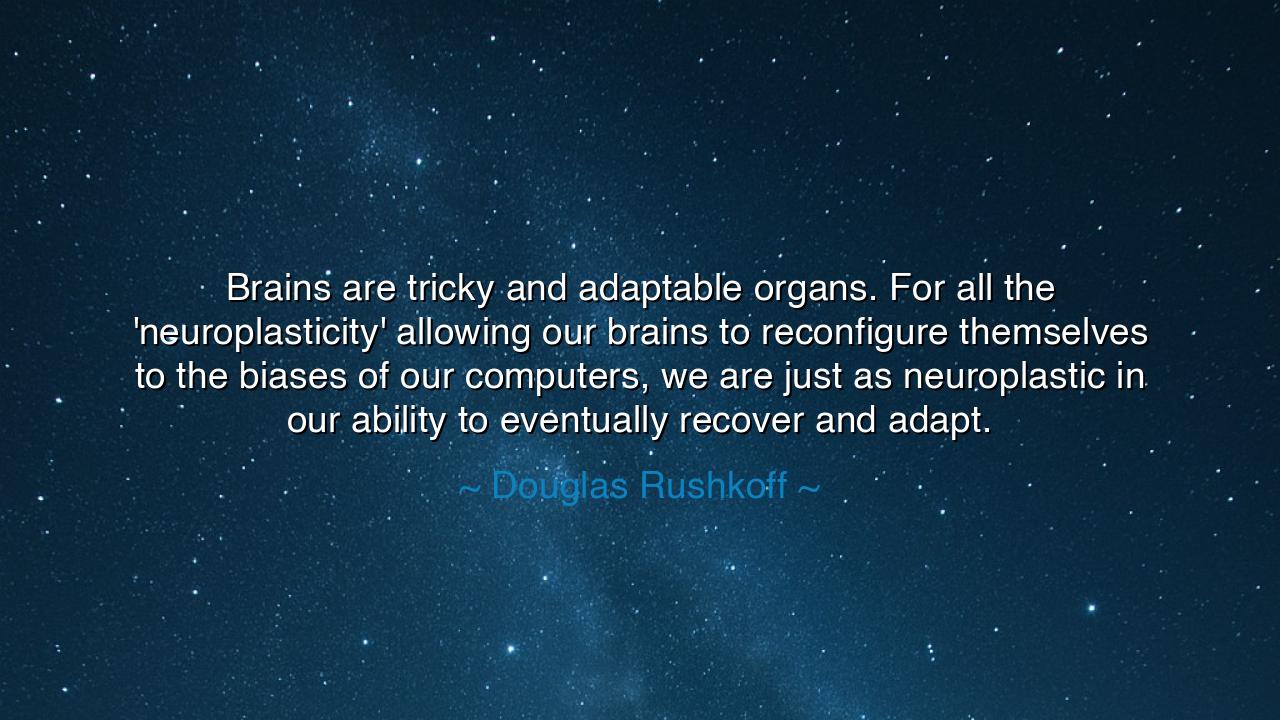
Brains are tricky and adaptable organs. For all the
Brains are tricky and adaptable organs. For all the 'neuroplasticity' allowing our brains to reconfigure themselves to the biases of our computers, we are just as neuroplastic in our ability to eventually recover and adapt.






“Brains are tricky and adaptable organs. For all the 'neuroplasticity' allowing our brains to reconfigure themselves to the biases of our computers, we are just as neuroplastic in our ability to eventually recover and adapt.” — so spoke Douglas Rushkoff, a philosopher of the digital age, a chronicler of how humanity bends and reshapes itself in the presence of its own creations. His words are both hopeful and humbling, a reminder that even as we are molded by our technologies, we are not bound by them. The human brain, he tells us, is a living mirror — ever-changing, ever-learning, capable of both surrender and recovery.
In his wisdom, Rushkoff speaks to the age in which we now live — an age where the computer and the screen have become our constant companions, shaping how we see, think, and feel. The term neuroplasticity itself, though born in science, is almost spiritual in its implication: it reveals that the mind is not fixed, but fluid, that our very thoughts carve new paths in the brain’s hidden forest. Every tap, every click, every glance at a glowing screen rewires us subtly — teaching us to think in shorter bursts, to crave speed, to mistake connection for depth. We adapt, yes, but often at the cost of stillness and reflection.
Yet Rushkoff’s message does not end in despair. He reminds us that the same plasticity that allows the machine to change us also gives us the power to heal, to reclaim the rhythms we have lost. For the human brain, unlike any other creation, carries within it a sacred resilience. Just as rivers reshape themselves after floods, just as forests regrow after fire, the mind can find its balance again — if only we choose to guide it. In this, we see the great paradox of our age: that technology may distract us from our humanity, but it also offers the chance to rediscover it.
Consider the story of Helen Keller, born into silence and darkness, cut off from the world that others so easily take for granted. By the grace of her teacher, Anne Sullivan, she learned to read not with eyes, but with touch — her mind reshaping itself, her senses awakening to new paths of understanding. What was once a closed world became boundless. Keller’s story stands as a timeless example of neuroplasticity in its truest form — proof that the human spirit, when guided by will and love, can adapt to any challenge, even those that seem insurmountable. If such a transformation can occur in darkness, what excuse do we have in the light of our screens?
So too, we must learn to reawaken what modern life has numbed within us. We can train our minds not only to absorb but to discern, not only to react but to reflect. We can reclaim attention from the chaos of digital noise. For adaptation is not surrender — it is mastery. Rushkoff’s words call us not to fear change, but to steer it, to become aware of how our environment shapes our thoughts and to act consciously within it. We are not slaves to our machines; we are creators, and our greatest creation is our own evolving mind.
Let us then take heart. The ancients taught that the mind is like a garden: neglect it, and weeds will grow; tend it, and it will flourish. The digital world is but a new climate for that garden — more demanding, perhaps, but not beyond our care. Practice mindfulness in your work. Read deeply, not quickly. Seek silence, that your inner voice may grow strong again. And when you feel fragmented by the pace of modern life, remember: your mind was made to heal. Your neuroplasticity is the divine reminder that renewal is always possible.
So, children of this age of light and code, remember Rushkoff’s teaching: the brain is both fragile and fierce. It bends, but it does not break. The world will continue to change — faster, louder, brighter — but within you lies the eternal power to adapt without losing yourself. Guard your attention, train your thought, and let your mind remain the master, not the servant. For as the river learns new courses through the earth, so too can the human spirit find its way, again and again, back to wholeness.






AAdministratorAdministrator
Welcome, honored guests. Please leave a comment, we will respond soon